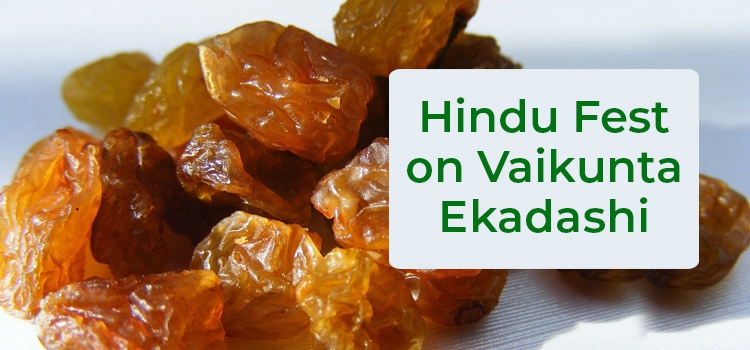Hindu Fest Vaikunta Ekadashi
Vishnu is one of the three major Hindu deities and is the one who preserves and sustains the Universe. His abode is called Vaikuntha, and only the spirits of those who have a pure heart can pass through its gates. But on the auspicious day of Vaikuntha Ekadashi, that passage is accessible to all, and devotees can attain Vaikuntha easily.
What is Vaikuntha Ekadashi?
The 11th lunar day of any fortnight is called Ekadashi. There are two dozen Ekadashis in a year, and Vaikuntha Ekadashi is the most auspicious of them all. It is also called Mokshada, “bestowing liberation.” On this holy day, the gates of Vaikuntha are open to all who seek moksha or salvation.
This event takes place in the bright fortnight of December/January, the Hindu month of Margazhi (Dec-Jan). Mythology says that the gods and demons churned the Milky Ocean for a thousand years to get Amrit, the divine elixir of immortality, which emerged from the ocean on this day.

On this day, devotees observe a partial or total fast and maintain silence while praying to Vishnu. Though several Hindus fast on all Ekadashi days, Vaikuntha Ekadashi is regarded as very special, and it is observed with great diligence. Many choose to take only water or milk.
On Vaikuntha Ekadashi, devotees visit famous Lord Vishnu temples like the Venkateshwara temple in Tirupati and the Ranganathaswamy temple in Srirangam. In Srirangam, the festival goes on for 21 days, and there are morning and night rituals.
The solstices which occur in this month mark the change in seasons. During this time, people draw beautiful patterns, called rangoli, using colored rice flour, on the floor outside their homes. It is believed that the gods are very attentive to our prayers at this time. Devotees rise before dawn, perform ablutions, and throughout the month, worship at temples.
Legend of Ekadashi:
According to Hindu mythology, Ekadashi is a goddess born of Vishnu’s mind. She defended dharma or righteousness and protected those in need. As she had the blessings of Vishnu, the forces of evil and ignorance were afraid of her. Vishnu offered her a boon saying that she could have wealth, fame, power, and beauty in the world of mortals. But she declined the boon and said that all she wanted was to share her blessings with mortals who observed fast and worshipped him on Ekadashi.
Vishnu agreed. He said that those who worshipped him by fasting on the eleventh day of the moon would get entry to his celestial abode. In the Mahabharata, Krishna, an avatar of Vishnu, tells this story to King Yudhishthira and praises her. He also recommended fasting, which is an ancient and effective spiritual practice.
Significance of Vaikuntha Ekadashi:
The Padma Purana talks of the significance of Vaikuntha Ekadashi. The Devas, fed up with the tyranny of the demon, Muran, went to Shiva, who sent them to Vishnu. While battling the demon, Vishnu realized that he needed a new weapon to slay Muran. So he retired to a cave for the goddess called Haimavati in Badarikashrama in order to take some rest and fashion a new weapon. When Muran tried to kill the sleeping Vishnu, a female power emerged from Vishnu and, with a glance, burned Muran to ashes. The pleased Vishnu named her 'Ekadashi' and told her to ask for a boon. But Ekadashi told Vishnu that people who observed a fast on that day should be freed of their sins. Vishnu agreed. He said that people who observed a fast on that day and worshipped her would attain Vaikuntha. In this way, the first Ekadashi came into being. This was a Dhanurmasa Shukla Paksha Ekadashi.
The demon Muran represents Rajasic and Tamasic qualities like anger, passion, lust, inertia, arrogance, etc. By conquering such tendencies, one can purify one’s mind. This is necessary if one is to attain moksha or liberation. Fasting helps us to avoid behaviors that are triggered by consuming certain foods. Keeping vigil at night symbolizes self-awareness. This brings peace and stillness and helps us to merge with God.
Rice is prohibited because Muran is said to dwell in it. Eating rice, which is heavy, makes one feel sleepy and hinders the vigil. The Bhagavad Gita, the conversation that Krishna had with Arjuna before the Kurukshetra War began, supposedly occurred on this day. The fast is broken on the next lunar day, called Dvadashi, by consuming fruits, herbs, and milk.



















